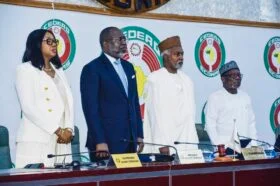Nigeria’s Minister of Foreign Affairs, Ambassador Yusuf Tuggar, has criticised the United States’ proposed visa restrictions on all ECOWAS countries, describing the move as equivalent to imposing “non-tariff barriers” on trade and cooperation.
Tuggar, who chairs the ECOWAS Mediation and Security Council (MSC), raised the concern during the Council’s 54th Ordinary Session at the Ministerial Level held on Wednesday in Abuja.
Correspondent reports that U.S. Secretary of State, Marco Rubio, recently announced visa scrutiny for 36 countries, many of which are ECOWAS members. Under the new proposal, affected countries have a 60-day window to comply with revised requirements or face travel bans.
Tuggar warned that such restrictions would negatively affect trade, diplomacy, and regional development between the U.S. and West Africa.
“It would, therefore, be a remiss of me if I did not mention the apparent recent decision by the Government of the United States to include all ECOWAS countries in its visa restrictions (Togo was on an earlier list),” he said.
“This would be most unfortunate if it comes to pass, because we are a region of opportunities ready to do deals. We possess critical minerals and even rare earths such as Samarium from the Monazite found in my home State of Bauchi.”
He stressed that the restrictions amounted to obstructing partnerships by denying essential travel access to government officials, technocrats, and business leaders.
“ECOWAS countries and the U.S. have a rare opportunity to create a partnership based on principles of need. We are also a strategic alternative to more distant and politically divergent energy producers. So, we will do deals for our prosperity,” Tuggar said.
“The only question is with whom? Who takes up the opportunities in our region by allowing government officials and technocrats, business executives and entrepreneurs to travel freely back and forth to close the deals?”
In his opening remarks, ECOWAS Commission President, Dr Omar Touray, noted the significance of the meeting as it coincides with ECOWAS’ 50th anniversary.
He highlighted the Council’s longstanding contribution to regional peace and security over the past 25 years and briefed participants on the political and security situation across the subregion.
“We will update on the transition process in Guinea and the negotiation process between ECOWAS and Burkina Faso, Mali and Niger,” he said.
He added that updates would also cover maritime security, terrorism, transnational organised crime, and the outcomes of ECOWAS Missions in The Gambia and Guinea-Bissau.
Touray further outlined progress made in strengthening the region’s security framework, including memoranda on the ECOWAS Standby Force Logistics Concept, the ECOWAS Logistics Depot Policies, and the West African Police Information System (WAPIS) Regional Platform.
He also noted the bloc’s improved engagement with Burkina Faso, Mali, and Niger following their withdrawal, with efforts underway to safeguard ECOWAS’ achievements and explore future cooperation in development and security.
“This is significant as fake news has contributed to the complications of our security and political environment in recent years,” Touray said.
(NAN)


